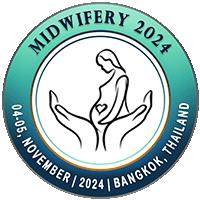
Dongmei Wei
West China Second Hospital, Sichuan University, ChinaTitle: Preliminary study on the effect of ultrasound on postpartum uterine involution and breast pain: a randomized controlled trial
Abstract
To evaluate the safety and efficacy of low-intensity focused ultrasound (LIFUS) therapy in promoting fundus descent and relieving postpartum breast pain compared with sham treatment. A multicentre, randomised, sham-controlled, blinded trial was conducted. A total of 176 participants were enrolled from three medical centres and subsequently randomised into the LIFUS or sham group. All participants provided three times treatment, LIFUS signal to the uterus and breast site through coupling gel, wherein a ultrasound signal output was absent in sham group. The primary outcome was measured the fundal height of the uterus. The visual analogue scale (VAS) score, as a secondary outcome, was used to simultaneously assess breast pain and the correlation between breast pain and fundal height as the outcome. The participants of whom seven did not complete treatment. Overall, a statistically significant difference was noted in the rate and index of fundus descent after each treatment. The rate and index of fundus descent were more significant following the second (rate: 1.3 cm/d; index: 0.13, P < 0.001) and third (rate: 1.71 cm/d; index: 0.26, P < 0.001) treatments in the LIFUS group. VAS scores, which were based on the continuous variable for the baseline, first, second, and third treatments in the LIFUS (2.23, 1.16, 0.78, and 0.28 points, respectively) and sham groups (2.09, 1.64, 1.98, and 2.49 points, respectively), had a statistically significant difference between the two groups. Meanwhile, the differences in VAS score classification variables between the two groups were statistically significant. A significant correlation was observed between the VAS score decrease and fundus descent rate; the more the VAS score decreased, the faster was the fundal decline rate in the LIFUS group. LIFUS therapy is safe and effective, which contributes to accelerated uterine involution and relieved postpartum breast pain.
Biography
Dr. Dongmei Wei, MD, Professor, Master's Advisor, and Deputy Chief Physician of the Department of Obstetrics and Gynecology at West China Second Hospital, Sichuan University, specializes in the diagnosis and treatment of female urological and pelvic floor dysfunction disorders, female genital reconstructive surgery, common conditions in obstetrics and gynecology including the lichenoid vulvar diseases, as well as perinatal and postpartum care. She has been engaged in research on female pelvic medicine, with a particular focus on the epidemiology, underlying molecular pathology, and clinical management of pelvic floor disorders and vulvar chronic conditions. She has over 30 publications in reputed journals and has been serving as an editorial board member of several journals.

